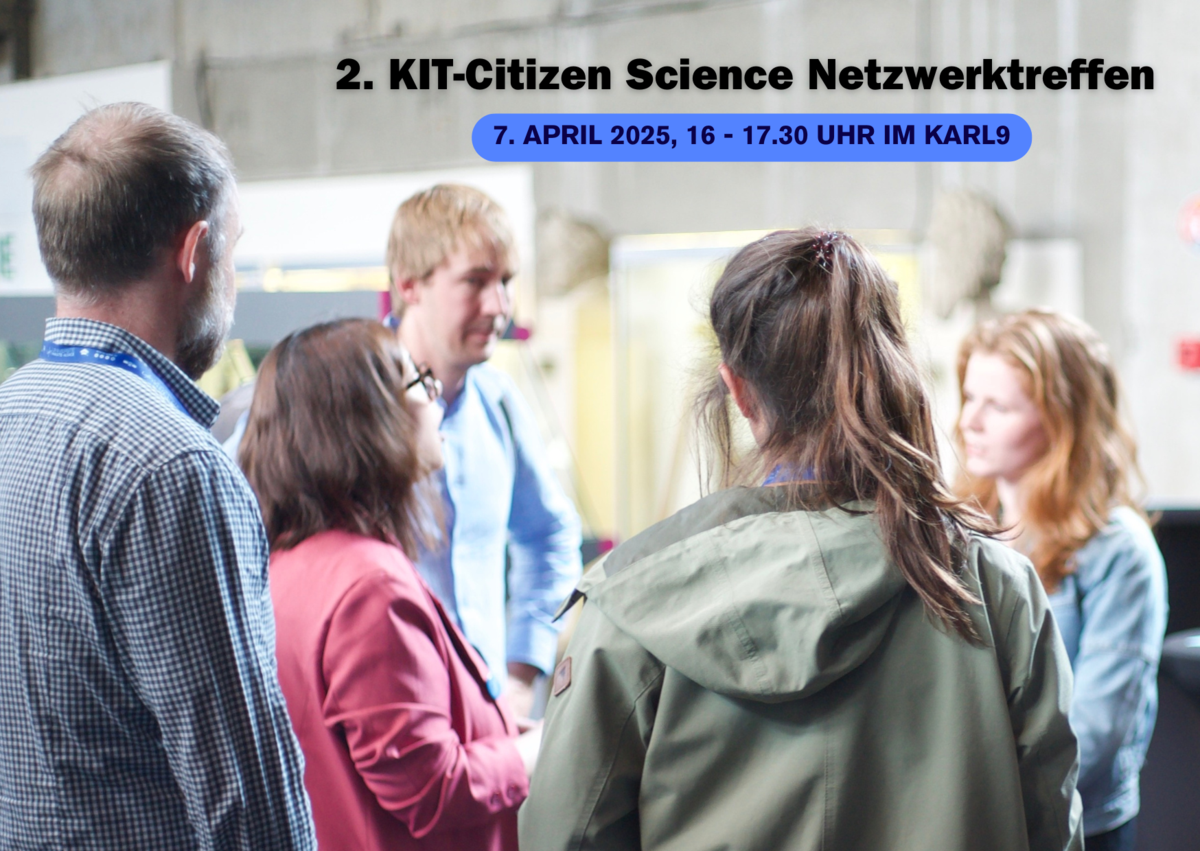2. KIT-Citizen Science Netzwerktreffen
Montag, 7.4.2025, 16:00 - 17:30 Uhr, im Karl9 – Wissenschaftslokal für Technik und Gesellschaft
Das Treffen gibt Impulse für den Einsatz von Citizen Science am KIT und schafft Raum für den Austausch über die Zusammenarbeit von Wissenschaft und Gesellschaft: Wo findet der Dialog mit der Gesellschaft bereits statt? Welche Best-Practice-Beispiele gibt es am KIT? Was sind unsere Visionen für die zukünftige Einbindung von Bürgerinnen und Bürgern in die Forschung?
Alle interessierten Forschenden und Mitarbeitenden des KIT sind herzlich eingeladen. Melden Sie Ihre Teilnahme und ggf. Ihre Projektvorstellung hier an oder kommen Sie kurzfristig vorbei!
Veranstaltet wird das Treffen von INTL in Kooperation mit dem KIT-Zentrum Mensch und Technik und dem Institut für Technikfolgenabschätzung und Systemanalyse (ITAS)
Kontakt bei Fragen: Hoai Truong, E-Mail: hoai.truong∂kit.edu
Vergangene Events
Panel Discussion: Large Language Models in Academic Teaching: De- or Up-Skilling
The Academy for Responsible Research, Teaching, and Innovation (ARRTI) and International Affairs (INTL) are organizing a panel discussion on "Large Language Models in Academic Teaching: De- or Up-Skilling?" on 6 February 2025, 18.00 - 19.30 at Triangel, within the framework of the EPICUR SHAPE-IT project.
In this event we will analyze both the critical dimensions of the discussion and the opportunities that this new technology brings. Not only does it offer new possibilities for knowledge transfer, but it also raises fundamental questions about the roles of teachers and learners, especially in the academic world. In particular, we will explore whether LLMs are more likely to lead to deskilling - a reduction in skills - or upskilling - an increase in skills - in academic teaching, and how this should ultimately be assessed.
On the podium:
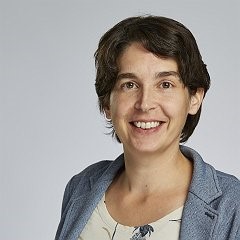
Anne Koziolek (Karlsruhe Insitute of Technology, Karlsruhe)
Anne is a professor at Karlsruhe Institute of Technology (KIT), Germany. She received the Diplom degree in informatics from University of Oldenburg, Germany, in 2007 and the PhD degree in informatics from KIT in 2011. After that, she was a Postdoc at the University of Zurich, Switzerland, before joining KIT as an assistant professor in 2013 and becoming a full professor in 2019.
Anne is interested in conciliating model-based software engineering with development processes that have fast and agile feedback cycles and thus combine the benefits of both approaches. In particular, she is interested in tool support for systematic, yet low-cost model-based design space exploration to support making good design decisions. Here, she and her group explore two strands: (1) keeping architectural models consistent with code automatically and (2) using NLP and sketch recognition to capture design discussions on e.g. whiteboards and in relating such information to (semi-)formal models and code.
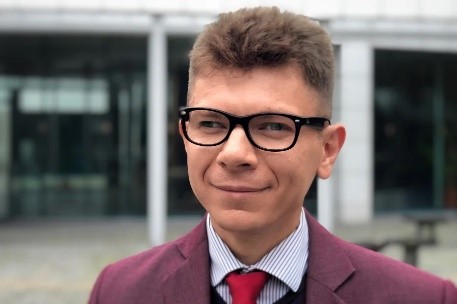
Filip Bialy (Adam Mickiewicz University, Poznań)
Dr Filip Bialy is an Assistant Professor at Adam Mickiewicz University in Poznań and a Research Associate at the University of Manchester. His research interests focus on the social and political implications of artificial intelligence and other emerging technologies. In particular, he explores the relationship between digitalisation and political concepts and ideologies. At the same time, he is actively engaged in promoting the adoption of AI ethics in the private and public sectors, and in bringing AI literacy to underrepresented communities. Filip Bialy holds a PhD in political theory and a postgraduate diploma in computing and big data. He has been a visiting fellow at the London School of Economics and Political Science, the University of Cambridge, and the Humboldt Institute for Internet and Society.

Gregor Betz (Karlsruhe Insitute of Technology, Karlsruhe)
Gregor Betz is professor of philosophy of science at the Karlsruhe Institute of Technology. He’s been studying the limits of scientific prediction, esp. in economics and climate science, the role of values in science, requirements of democratic scientific policy advice, and the ethics of climate engineering. He has developed a formal theory and computational models of argumentative debate, and applied these methods to clarify key concepts in epistemology, to interpret classical texts, to assess consensus- and truth-conduciveness of debate, as well as to to improve critical thinking teaching.
Since the release of GPT-2 in 2019, Gregor has been pursuing computational philosophy projects at the intersection of NLP and AI involving so-called large language models. Moreover, in 2023, Gregor has founded Logikon AI, a startup that applies critical thinking methods to improve generative AI.
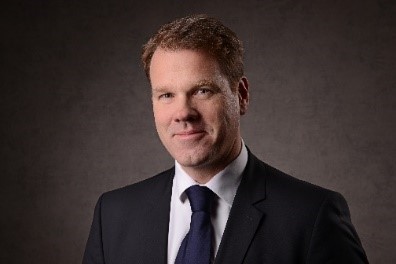
Ulf-Daniel Ehlers (Duale Hochschule Baden-Württemberg Karlsruhe, Karlsruhe)
Prof. Ulf-Daniel Ehlers is the founder of mindful-leaders.net and a seasoned social entrepreneur. He serves as a Professor of Educational Management at Baden-Wuerttemberg Cooperative State University (DHBW). In 2011, he initiated Germany's first Cooperative University, which now educates 35,000 students. In 2017, Prof. Ehlers founded NextEducation as a research group, focusing on the future of education and Future Skills. Until 2023, he served as Scientific Director at Karlsruhe Institute of Technology (KIT). Prof. Ehlers has collaborated with more than 30 universities worldwide and held leadership roles in networks such as EURASHE and EDEN. He has delivered keynote speeches in 45 countries and authored over 20 books and 300 academic articles. As a trained systemic coach, Ulf integrates Future Skills into educational initiatives for sustainable development.
Moderator:
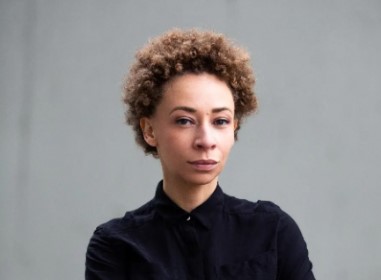
Katharina Linnepe
Since studying political science, sociology and philosophy, Katharina Linnepe has been working on socio-political and scientific issues both professionally and personally. As a presenter, podcaster and speaker, she initiates dialogues and discussions; as a comedian and content creator, she is a satirical social critic. Katharina Linnepe's first non-fiction book on the state of patriarchy will be published in 2025.
Photo credit: Laura Nickel
Contact:
Alexander Bagattini (ARRTI): a bagattini ∂does-not-exist.kit edu
Hoai Truong (INTL): hoai truong ∂does-not-exist.kit edu


